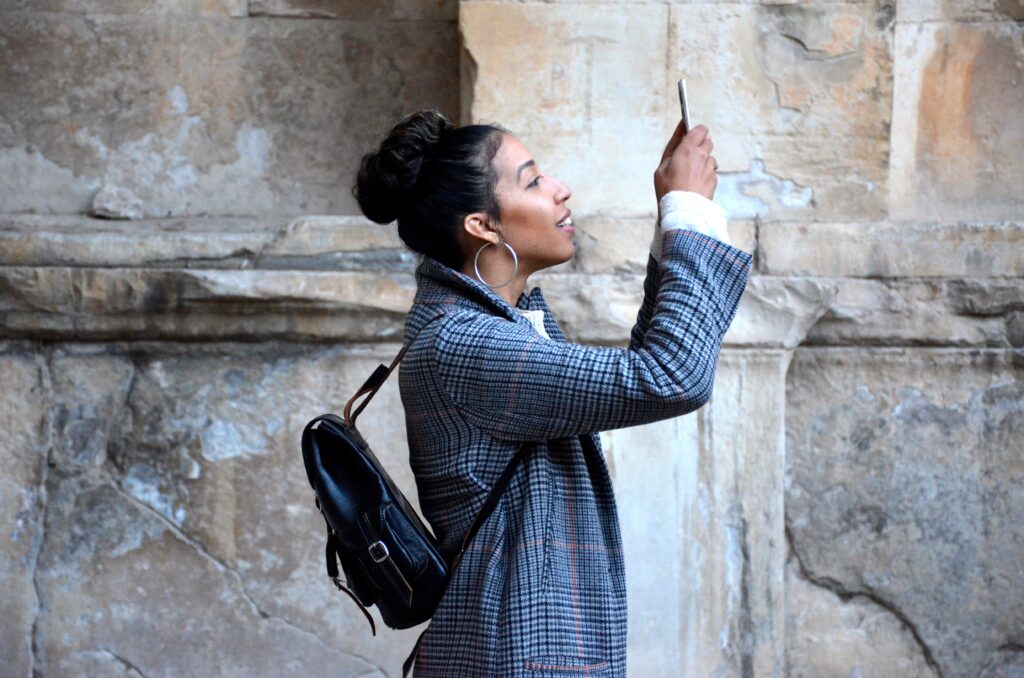
Would you look at this selfie of me? Aren’t my eyes clear, my skin porcelain and my brows almost perfect in their precision?
Needless to say, this selfie of me actually looks nothing like the real me. The photo was taken with the aid of a filter which I thought I’d never succumb to. Until I did. I remember this day and I know for a fact, there were bags under my eyes, grey in my hair and lines across my forehead.
The psychology behind the selfie
So why do we do it? Why do we post sexy selfies which bear only the most fleeting resemblance to our real life selves? And what do we hope to gain from it? Director of the Media Psychology Research Centre, Dr Pamela Rutledge, thinks she knows,
People are trying different identities, trying different ways of looking at themselves, trying to understand how other people see them, and trying to see what their aspirational self looks like.
Dr Pamela Rutledge
The downside of the selfie
If Rutledge is right then the selfie sounds playful, charming and self exploratory. What harm can there be in adopting poses and attitudes in search of an image that best captures your true self? Well, the danger comes when people post selfies on social media. And then find their mood is negatively impacted by the reaction. Or they compare their looks and life to others, and become trapped in a circle of compare and despair. And if you think this is a problem exclusive to teenage girls, you’re mistaken. Research suggests it also prevalent for women in their thirties and forties. Possibly because genuine signs of aging are starting to appear. And also because they’re more likely to be able to afford specialist facial work.
Cosmetic Surgeon Dr Julian De Silva, reported that women are having cosmetic surgery younger. The average age for the first treatment is now 39, previously it was 42. He believes this is probably due to the rise of selfies and photo filtering software. Women now want to look the same as the edited, airbrushed social media version of themselves.
And some celebrities like Kim Kardashian have managed to maintain an impossibly youthful appearance, despite being 40 and a mother of three. Thereby raising the bar to an unattainable standard for other women.

The way back to good self esteem
If any of this resonates with you, then the first step is simply being aware of your social media use. How long are you spending on social media and what are you doing there? Are you genuinely using it to catch up with friends and promote your business, or have you fallen into compare and despair regarding your looks or lifestyle? Secondly, get honest about how it makes you feel. If you find yourself constantly refreshing to check numbers, reactions and comments, and feeling deflated if a selfie doesn’t ‘do well’, then this may indicate a problem. Similarly, if you feel exposed or irritated if a friend posts a natural, unposed shot of you, or you’re considering getting invasive treatments to look better in photos, then it may be worth talking to a counsellor.
In the short term I can wholeheartedly recommend The Comparison Cure by Lucy Sheridan. The UK’s first and only comparison coach. It’s a great book which really enables you to explore feelings around social media and self esteem as it relates to you. I will be reviewing it shortly but in the meantime her Instagram account is great, and full of wisdom.
Lastly, I would love to hear your thoughts and experiences on selfies, self esteem or social media. If you’re happy to share please go ahead and use the form below.
